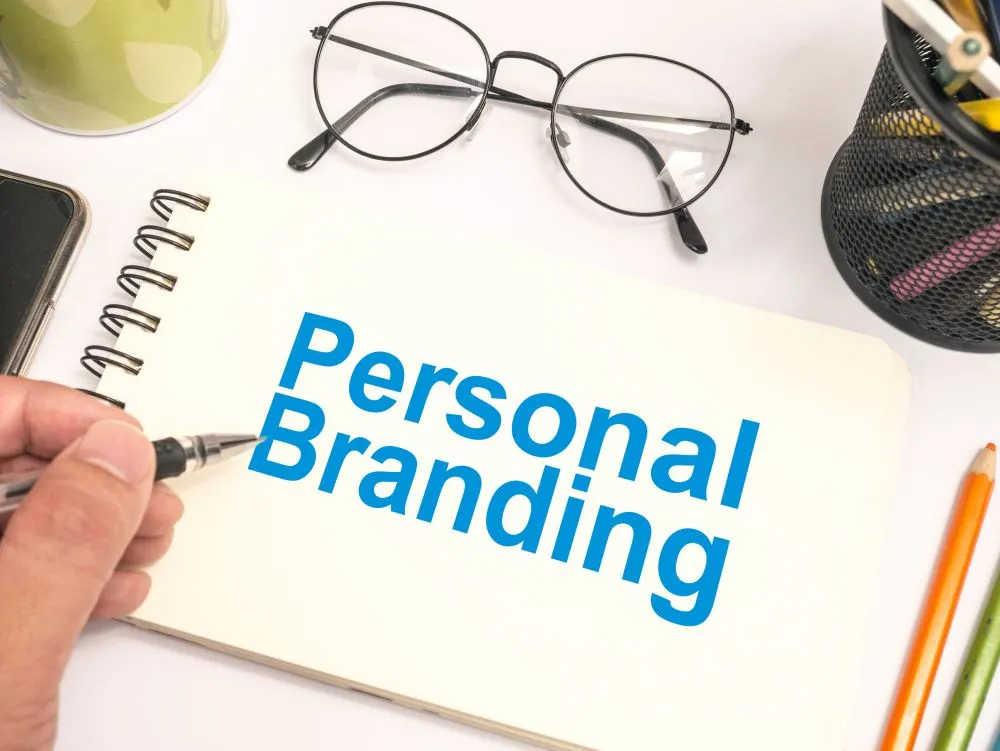Have you ever thought about what you want to be known as in the eyes of other people? Or do you actually want to get recognition for your professional career? If this has been worrying you for a long time, then start getting to know the term personal branding.
As the name suggests, personal branding means other people's opinions about you as a professional worker as well as in your personal life. So that you become more familiar with the terms and how to build good personal branding, read the following review.
What is Personal Branding?
Personal branding is the process of creating and managing your own image or reputation, both in the real world and online. The goal of personal branding is to differentiate yourself from others and highlight your unique strengths and value offerings.
This can involve various elements such as the way you communicate, your appearance, your skills, and the values you hold. From this it can be concluded that personal branding refers to how other people perceive you, both in your professional career and social life.
Benefits of Personal Branding
Personal branding offers a variety of significant benefits, both in professional and personal contexts. Here are some of the main benefits of personal branding:
1. Increased Visibility
Personal branding helps you to become better known in your industry or community. By having a clear and consistent image, you become more memorable to others, which can increase your chances of getting the attention you want.
2. Create Career Opportunities
Effective personal branding can open the door to new career opportunities, including job offers, promotions, and exciting projects. It can also help you get invitations to speak at industry events or collaborate with other parties.
3. Control Over Self-Image
With personal branding, you have more control over how others see you. You can convey the messages and values that you consider important and ensure that public perception matches the identity you want to highlight.
4. Increased Influence and Impact
With a strong image, you can influence others and make a bigger impact in your community or industry. This can strengthen your position as a thought leader or innovator in a particular field.
5. Balance Between Personal and Professional Life
Personal branding can also help you align your personal and professional life. By having a consistent personal brand, you can create harmony between how you are known in the world of work and everyday life.
How to Build Personal Branding
Personal branding has become an important need in the current era. Therefore, every person who wants to be known for their skills and competencies must be able to build a good personal brand. So what are the steps? Check out the following review on how to build personal branding.
1. Identify Your Own Strengths and Weaknesses
Building a personal brand by identifying one's own strengths and weaknesses is an important step in creating an authentic and effective self-image. One way that can be used is to do self-reflection by looking at what you think you are capable of doing or not.
First, identify the advantages in the following ways.
- What key skills and expertise do you have? For example, communication skills, leadership, problem solving, or technical skills.
- What positive qualities set you apart from others? For example, self-confidence, empathy, or creativity.
- What is an important accomplishment or experience in your life? This could be a successful project, award, or unique experience.
Next, identify shortcomings within yourself as well.
- What skills or areas do you feel need improvement? For example, time management skills, technical skills, or public speaking abilities.
- Are there any traits or habits that often hold you back? For example, a tendency to procrastinate, a lack of attention to detail, or difficulty working in a team.
2. Determine How You Want to be Known
Nowadays, there are many choices of ways to introduce yourself. Of course, this could also be an interesting choice for those of you who want to build personal branding. Almost everyone consumes content, from digital to conventional.
For example, if you want to become a content creator, develop content that fits your main image and message. If you want to be known as an expert in a particular field, create articles, videos, or presentations that demonstrate your knowledge and expertise. Also make sure the content you create is consistent with the image and message you set. This includes blogs, social media, and professional communications.
3. Study Your Target Audience
Studying your target audience allows you to tailor your messaging and branding strategies accordingly. The following are concrete steps that can be taken to get the appropriate target audience:
- Determine the key audience groups you want to reach. This could include fellow professionals, potential clients, industry leaders, or communities of particular interest.
- Create a demographic and psychographic profile of your audience, such as age, gender, location, occupation, interests and challenges they face.
- Learn what your audience needs and wants. What problems are they facing and how can you provide a solution?
- Identify the key challenges your audience faces. This helps you tailor your messages and offers to be relevant to their needs.
- If you want to get involved as a content creator, research the social media platforms most frequently used by your audience. Are they active on LinkedIn, Instagram, Twitter or other platforms?
- Know what types of content your audience will find most interesting, such as articles, videos, infographics or podcasts. This helps you in creating content that suits their preferences.
- Finally, create content that adds value to your audience. These could be practical guides, industry insights, or solutions to common problems they face.
4. Consistent
Personal branding is not an instant thing, where you produce it now and then the next day you are known as someone who is an expert in that field. In the end it all comes down to consistency, because the audience sees how deep your understanding of the field is.
The more often they are exposed to the content or habits you create, that's where your personal branding is formed. Let's take an example, for example if you want to be known as a beauty content creator then you definitely have to produce beauty content consistently. That way, the audience will be more confident that you are an expert in that field.
Another example, if you have good public speaking and work for a company, you may be trusted to be assigned as an MC at formal or informal office events.
5. Develop Networking
Developing networking is an important part of building a successful personal brand. A broad and strong network can increase visibility, provide opportunities and strengthen your image. Join industry groups, engage in discussions, and share content relevant to your expertise. This helps you to strengthen your knowledge and opportunities to become better known in the field you are working in.
You can use social media platforms such as Twitter, Instagram, or Facebook to connect with relevant professionals and communities. Follow accounts and engage in conversations related to your industry. Apart from that, provide meaningful value so that you are remembered as a person with a good reputation.
6. Continue Upgrading Skills
Today's needs are dynamic, where each person can have various different competencies. Of course, this provides its own advantages because it opens up more career opportunities. For example, you have a professional career as a teacher, but besides that you also have a business and manage it yourself.
There is no need to hesitate to expand into other fields by continuing to upgrade new capabilities. This shows that you are an adaptive person and are not left behind with current developments. The other most important thing is to keep learning and not get complacent, you will get lots of other new opportunities out there.
Currently there are various platforms for self-development and many of them are free. Such as YouTube, Instagram, and Podcasts. There are also several alternative bootcamps or short courses to sharpen the knowledge you have mastered.
7. Take Advantage of Digital Platforms
As previously mentioned, utilizing digital platforms can be an important step in creating and maintaining your professional image. Each platform is certainly different in its use, therefore it needs to be adjusted to the personal branding you want to build.
Starting from LinkedIn which is specifically for career development and personal branding. Create a complete and professional profile, including a summary, work experience, skills, and recommendations. Use LinkedIn to share articles, insights and participate in industry discussions.
For those of you who are creative workers, Instagram could be an interesting choice. This platform is used to showcase your creative or professional side with relevant visual posts, such as photos of projects, events or achievements.
Apart from that, there are also blogs or personal websites that can be used as portfolios to convince clients you want to work with. This social media is used to write articles that demonstrate your expertise, discuss industry trends, or offer practical guidance. This helps solidify your position as a leading thinker in your field.
Examples of Good Personal Branding
If you want to start building personal branding, then the stories of world figures could be the best example. The importance of personal branding has made them successful in maintaining a good public image until now. This is an example of personal branding from a successful world figure.
1. Steve Jobs - Businessman and Former CEO of Apple
Steve Jobs is a very famous example of someone's successful personal branding. Here are some key elements of Steve Jobs' personal branding that can provide inspiration:
- Vision and Innovation
Steve Jobs was known for his revolutionary vision in technology and design. He often positioned himself as a pioneer of innovation, pushing the boundaries of technology and product design by introducing products such as the Macintosh, iPod, iPhone, and iPad.
- Appearance Style
Jobs was known for his simple but iconic look—black turtleneck t-shirt, blue jeans, and sneakers. This image reflects the minimalist and functional design principles he applies to Apple products.
- Commitment to Quality
Jobs placed great emphasis on product design that not only looked good but also provided a great user experience. This reflects its commitment to quality and detail.
- Leadership Style
Jobs is known as an inspirational and charismatic leader. He encourages his team to think big and innovate, but is also known for having a tough and demanding leadership style.
- Building an Image Through Stories
Jobs often shared his personal story, including his journey from humble beginnings to great success. Jobs' famous quotes, such as “Stay hungry, stay foolish,” and his famous speech at Stanford University, reflect his life philosophy and provide inspiration for many people.
2. Oprah Winfrey - Celebrity and Successful Entrepreneur
Next there is Oprah Winfrey who is known as a philanthropist and successful woman. Oprah's personal branding can be analyzed through several key elements that shape her public image and influence:
- Positive and Authentic Image
Oprah is known for her openness in sharing personal and emotional stories, both in interviews and on her TV programs. This creates a very human and close image in the eyes of the public.
- Vision and Mission
Oprah positions herself as a leader who empowers others through her programs, books, and events. Its mission often focuses on inspiring, motivating, and giving people a voice.
- Consistently Present Quality Content
Her program, "The Oprah Winfrey Show," is a platform where Oprah features guests from various backgrounds, talks about their life experiences, and offers deep insights. This event not only entertains but also educates and inspires many people.
- Consistent Brand
Oprah uses a consistent logo and design in all of her projects, including books, magazines, and social media platforms, to strengthen her personal brand.
- Courage to Change
Oprah didn't just stop at television, she was also successful in the worlds of publishing, film and technology. His courage to diversify his career shows flexibility and innovation in his personal branding. She launched The Oprah Winfrey Network (OWN) demonstrating her ability to adapt and evolve according to market and audience needs.
3. Dwayne Johnson (The Rock) - Professional Wrestler and Actor
Dwayne Johnson, known by the nickname "The Rock," is another great example of successful personal branding. The Rock positions himself as someone who is physically strong and a successful actor. Here are the main elements of Dwayne Johnson's personal branding that make him so well known and influential:
- Image and Appearance
Dwayne Johnson is known for his athletic build and outstanding physical strength, which is a large part of his image as a former professional wrestler and action actor. His clothing style can be adjusted from casual to fashionable, this reflects his ability to switch between casual and formal styles.
- Charisma and Personality
Dwayne Johnson is known for his fun and energetic personality. He often interacts with fans via social media in a friendly and cheerful manner.
- Success and Multidimensionality
As a successful former WWE wrestler, Johnson built a reputation as "The Rock," which provided a strong foundation for his personal branding. His success in the wrestling ring helped cement an image of strength and endurance.
Apart from that, Johnson managed to move into the film industry, such as Fast & Furious, Jumanji, and San Andreas which helped strengthen his action image. He is also known as a successful entrepreneur with various investments, including co-founding the production company Seven Bucks Productions.
- Use of Social Media
Johnson has a strong presence on social media, especially on Instagram and Twitter. He frequently shares moments from his daily life, workouts, and interactions with fans, which helps build and maintain a connect with his audience.
- Creativity and Innovation
Lastly, Johnson not only acts as an actor but also as a producer and content creator, such as in the films and TV shows he produces himself, as well as his involvement in the development of entertainment content.
By utilizing personal branding effectively, you can open up opportunities, build beneficial relationships, and achieve personal and professional goals more easily. Therefore, it is important to build it from now on if you want to be better known for the skills you have.






